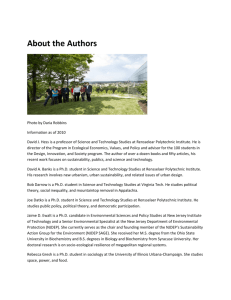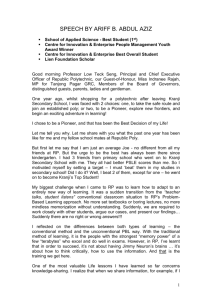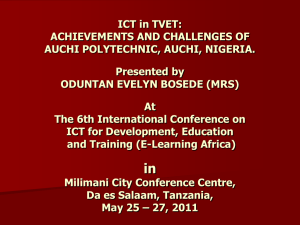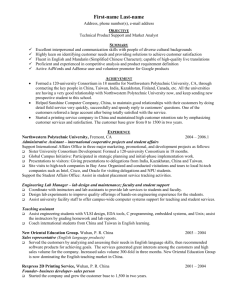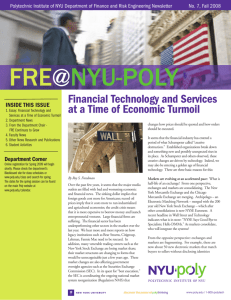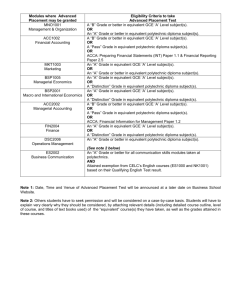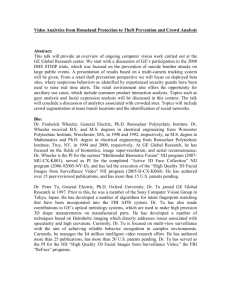Financial Engineering at Polytechnic: More than Finance and
advertisement
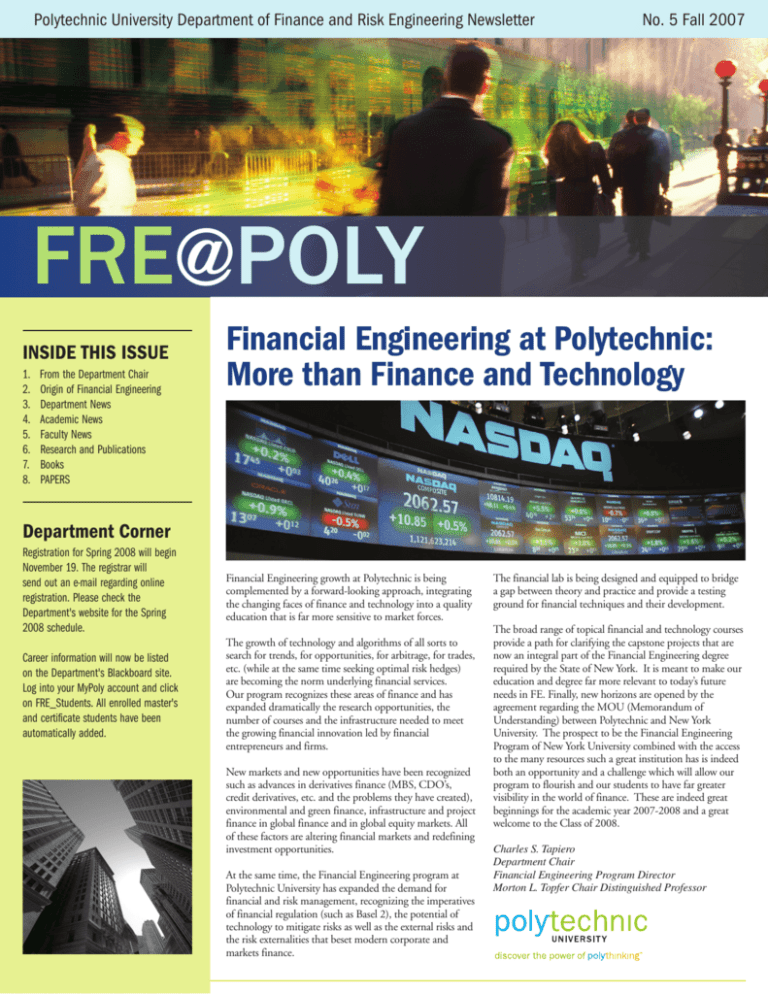
Polytechnic University Department of Finance and Risk Engineering Newsletter No. 5 Fall 2007 FRE@POLY INSIDE THIS ISSUE 1. 2. 3. 4. 5. 6. 7. 8. From the Department Chair Origin of Financial Engineering Department News Academic News Faculty News Research and Publications Books PAPERS Financial Engineering at Polytechnic: More than Finance and Technology Department Corner Registration for Spring 2008 will begin November 19. The registrar will send out an e-mail regarding online registration. Please check the Department's website for the Spring 2008 schedule. Career information will now be listed on the Department's Blackboard site. Log into your MyPoly account and click on FRE_Students. All enrolled master's and certificate students have been automatically added. Financial Engineering growth at Polytechnic is being complemented by a forward-looking approach, integrating the changing faces of finance and technology into a quality education that is far more sensitive to market forces. The growth of technology and algorithms of all sorts to search for trends, for opportunities, for arbitrage, for trades, etc. (while at the same time seeking optimal risk hedges) are becoming the norm underlying financial services. Our program recognizes these areas of finance and has expanded dramatically the research opportunities, the number of courses and the infrastructure needed to meet the growing financial innovation led by financial entrepreneurs and firms. New markets and new opportunities have been recognized such as advances in derivatives finance (MBS, CDO’s, credit derivatives, etc. and the problems they have created), environmental and green finance, infrastructure and project finance in global finance and in global equity markets. All of these factors are altering financial markets and redefining investment opportunities. At the same time, the Financial Engineering program at Polytechnic University has expanded the demand for financial and risk management, recognizing the imperatives of financial regulation (such as Basel 2), the potential of technology to mitigate risks as well as the external risks and the risk externalities that beset modern corporate and markets finance. The financial lab is being designed and equipped to bridge a gap between theory and practice and provide a testing ground for financial techniques and their development. The broad range of topical financial and technology courses provide a path for clarifying the capstone projects that are now an integral part of the Financial Engineering degree required by the State of New York. It is meant to make our education and degree far more relevant to today’s future needs in FE. Finally, new horizons are opened by the agreement regarding the MOU (Memorandum of Understanding) between Polytechnic and New York University. The prospect to be the Financial Engineering Program of New York University combined with the access to the many resources such a great institution has is indeed both an opportunity and a challenge which will allow our program to flourish and our students to have far greater visibility in the world of finance. These are indeed great beginnings for the academic year 2007-2008 and a great welcome to the Class of 2008. Charles S. Tapiero Department Chair Financial Engineering Program Director Morton L. Topfer Chair Distinguished Professor Polytechnic University Department of Finance and Risk Engineering Newsletter Research Report at POLY: Memory and Persistence in Stochastic Finance and Insurance By Charles S. Tapiero, Topfer Chair Distinguished Professor And Department Chair (Finance and Risk Engineering) Polytechnic University, New York The search for non-random patterns in apparently random financial data is of concern in a broad variety of fields and an extremely large number of techniques and approaches are used for that purpose. In attempting to capture the “spirit” of financial markets and insurance claim processes for example, jump and Levy processes and stochastic differential equations are profusely used to capture the random character of risk events and assets prices. Explicitly, in actuarial science much use is made of the Poisson process (or processes based on similar assumptions which assume an essential intertemporal independence across events) while in finance the Brownian motion is used to represent the behavior of an underlying process uncertainty—albeit presuming that uncertainty is not motivated, and defining a white and independent noise. These models assume that “uncertainty” is independent of its past, presuming that memory has no effect on future events uncertainty. Of course, “dynamic modeling” has sought to circumvent such assumptions by modeling. That is, constructing mathematical models that carry over time past events in a predetermined manner. In this sense, any dynamic model is a “present of its past and a present of its predictable future”. Academic News Reality is far more complex however and beset by rare events, herd behavior, Black Swans and complex covariations that render our understanding of financial markets data tenuous at best. Recent events in financial markets have clearly pointed out that markets are stormy, ex-ante unpredictable, albeit they may be explained well ex-post. The search for techniques and a better appreciation of the numerous factors that contribute to markets incompleteness is therefore extremely rewarding to the successful and a perpetual challenge bringing great rewards to those that discover—even if such advantages are temporary, fast disappearing. In a recent paper, of Vallois and myself, (Physica A, 2007), the effects of short term memory on financial modelling was investigated, providing a framework to enrich our appreciation of uncertainty when time dependence among statistical events is altering the basic premises of Browniam motion modeling. Memory has a persistence effects which has nonlinear effects on the evolution of volatility, albeit, a nonlinearity stymied by time. It may induce a herding or counter herding behavior. In addition, it renders the process of pricing in such markets more complex. By the same token, in counting data, presumptions that events (even rare) are temporally independent is also questionable. Do periods of intense Hurricane activities follow intense activities or not. Or does such an activity matter in any case? Do claimants tend to repeat claims once they have claimed or not? When a memory is structured and sets in in a structural and statistical manner, these questions of practical importance become also questions of theoretical importance and provide the means to test the statistical hypotheses against which the unavoidable evidence that reality present us with is to be confronted. Memory-Based Persistence in A Counting Random Walk Process by Pierre Vallois and Charles S. Tapiero, Physica A, October 2007 The three required courses are: FIN 2003 Economic Foundations of Finance, FIN 2103 Creating & Understanding Financial Statements and FIN 2203 Corporate Finance and Financial Markets. The Minor in Finance and Risk Engineering The Finance and Risk Engineering Department has inaugurated a minor in finance and risk engineering for all undergraduate engineering degrees at Polytechnic. To do so, FRE launched undergraduate classes for the fall 2007 semester; FIN 2003, Economic Foundations of Finance and FIN 2103, Creating and Understanding Financial Statements. The minor is designed to provide a thorough undergraduate grounding in finance to students with strong mathematical backgrounds, providing a business finance education to engineers and preparing engineers for the advanced master’s FE degrees. Professor Barry Blecherman is its director. For more information, please visit: www.poly.edu/fe and contact Professor Barry Blecherman at Blecherman@poly.edu. The PhD FRE’s proposal to the State of New York’s Department of Education is still pending for granting the PhD degree in Financial Engineering and Risk Analysis. The PhD will have two formats: a traditional full-time program and a part-time executive education format. For more information about the PhD, please contact Professor Barry Blecherman at Blecherman@poly.edu. The FRE minor requires the completion of 15 credits designated as “FIN.” At least nine of these credits must be earned at Polytechnic. www.poly.edu/fe Spotlight on K. Ming Leung The department is pleased to announce the addition of K. Ming Leung, professor of computer science as a member of the FRE department. Professor Leung will spearhead the revamping of the Financial Information Services and Technology track (FIST). He will evaluate the track for improvement and provide academic oversight for FIST students. Prof. K. Ming Leung has a PhD in Physics from the University of Wisconsin at Madison. His earlier research work was on the use of Monte Carlo simulation to study the dynamics of random spin systems and on critical phenomena. He was a postdoctoral fellow at the University of California – Santa Barbara before becoming an assistant professor in the physics department at Poly. He was promoted to associate professor and in 1988 to professor. K. Ming Leung, Room: LC 127, Tel: (718) 260-3380, E-mail: mleung@duke.poly.edu Website: http://magnus.poly.edu/~mleung/ FRE @ POLY News Department of Finance and Risk Engineering Polytechnic University Six MetroTech Center Brooklyn, NY 11201 For more information about the Power of PolyThinking and the Department of Finance and Risk Engineering, please visit: www.poly.edu/fe New Staff Introduction Irene Liao is the department software engineer and financial lab manager. Ms. Liao graduated from Tamkang University (Taipei, Taiwan) with a BS in Information Management in June 2005. She graduated in June 2007 from Polytechnic University with a Master of Science in Information Systems Engineering. While obtaining her master’s, Irene worked for Polytechnic University’s Graduate Admissions Office as their webmaster, and gradually moved into the role of recruiting new students from Taiwan. She acted as the primary liaison between Polytechnic and new applicants, prospective students, and admitted students, as well as the liaison between the University and recruiting companies in Taiwan. As a software engineer for the Finance and Risk Engineering Department, Irene provides IT support for the entire department and financial lab, and introduced the User eXtension Protocol (UXP) to the financial lab. She also assists department head Charles Tapiero in his day-to-day activities. Irene Liao, Software Engineer, Tel: (718) 260-3169, Fax: (718) 2603355, Office: RH 517D E-mail: wliao@poly.edu Polytechnic University Department of Finance and Risk Engineering Newsletter The Financial Lab The financial lab has been redesigned and expanded it’s hardware and software to help FRE students familiarize themselves with financial applications, perform research and conduct simulations of financial models. The tools of the financial lab are an important resource for all students who will be faced with the challenges of a capstone project. The lab is open Monday through Thursday from 10 a.m. to 5 p.m. and on Saturday from 10:30 a.m. to 1:30 p.m. Some of the following software applications can be found in the lab: Pro 2002 SP2, MS Office 2003, MS Visual Studio 2005, Eviews 6, GAMS 2.0.36, Matlab 2007, PalisadeTools (@RISK 4.5, Professional Version etc.), R 2.5.1, STATA/IC 10, S-Plus and others. Irene Liao is the lab software engineer and lab manager; Fred Novomestky is the academic advisor. For all matters relating to the lab contact Irene Liao (wliao@poly.edu). Lectures The Origin of the Financial Engineering Program By George Bugilarello, President Emeritus, Polytechnic University Dr. Bugliarello reflects on the impetus and vision for the financial engineering program. MetroTech, the university-industry park that was conceived by Polytechnic, had at its core the New York State Center of Advanced Technology in Telecommunications (CATT), for which Polytechnic had won a state competition. The center became an important factor in the drive to attract to MetroTech operational components of the New York financial industry that was being revolutionized by telecommunications and information technology. SIAC’s headquarters and major operations moved to MetroTech, and so did the information processing operations of J. P. Morgan Chase and Bear Stearns. It thus became logical to complement these developments with the creation of a graduate program in financial engineering that would enhance the interaction of Polytechnic with the financial industry and provide the industry with graduates possessing the strong mathematical background that the increasing sophistication of its financial products made ever more necessary. The Sloan Foundation responded very generously to our request for support and the program was launched in 1994. We were very fortunate to be able to attract as its director Dr. Andrew Kalotay, to develop the program with his splendid background of scholarship and experience. The program was envisioned while Dr. Bugliarello served as Polytechnic’s president. Department News This semester, the Financial Engineering program has made a great deal of changes. A redesigned curriculum was launched that included two significant additions: financial labs and the capstone. In addition, our course offerings were augmented and diversified. Students now have the choice of five financial labs and three different capstone options- a thesis, a project or an internship. With these curriculum changes, the program is more rigorous, more adapted to the marketplace and provides our students with a more competitive position to access the marketplace. The program welcomed its largest class ever – 97 students to the fall term. The total number of graduate students in financial engineering now numbers 256. Due to the growth of the program, classes are now held in two locations, 55 Broad Street and a temporary location at 14 Wall Street. In addition, a space is being built in the lower level of 55 Broad Street and we hope to move into this space sometime during the spring semester. www.poly.edu/fe The Topfer Chair Lecture Series in Financial Engineering & Technology Management, Professor Charles S. Tapiero presents: Nassim Taleb, Model Errors in Mathematical Finance Wednesday, November 28, 2007 6-7:30 pm Pfizer Auditorium Polytechnic University 6 Metrotech Center Brooklyn, NY ABSTRACT A discussion of the principal model errors and biases: fat tails, American options, dynamic hedging, misspecification of option formulas, fungibility of hedges, and hidden credit risks. Refreshments will follow the lecture. Nassim Taleb is currently a Visiting Professor at the London Business School and on leave as the Dean's Professor in the Sciences of Uncertainty, University of Massachusetts at Amherst. He is the author of the bestsellers The Black Swan: The Impact of the Highly Improbable and Fooled by Randomness. He is also a world authority in the finance of rare events and has taught at New York University's Courant Institute of Mathematical Sciences. Report: Awards for Exceptional Contributions Awards for exceptional contributions to the department were granted to Ron Slivka, Ingrid Marshall, Jean-Carlo Bonilla and Juliette Acker. On May 2, 2007, the department held an end of the semester gathering for faculty and students. At the event, the department honored four people: Ingrid Marshall, adjunct professor, Ronald Slivka, adjunct professor, Jean-Carlo Bonilla, associate director of the graduate center and adjunct professor, and Juliette Acker, program manager for the financial engineering program. Professor Marshall teaches financial accounting and Professor Slivka teaches Options and Derivatives. Erich Kunhardt, provost and chief academic officer, presented each person with a plaque and thanked them for their contributions to the success of the Financial Engineering program. Faculty News New Adjunct Faculty FRE has augmented its already outstanding collection of theoretical and finance practitioners. New adjuncts include Maureen Koetz, Lucas Bernard, Barry Guttenplan, Andrew Kalotay (founder of the FE program at Polytechnic University), Edward Emmer and Richard Van Slyke. Lucas Bernard comes to Polytechnic University with a varied background ranging from entrepreneurial experience to university teaching. He has taught corporate finance and business statistics for the past nine years. Holding master’s degrees in both mathematics (CUNY) and computer science (NYU’s Courant Institute of Mathematical Science), he is currently completing his doctoral dissertation on endogenous models of credit default at The New School for Social Research. He also has a certificate in Financial Asset Management & Engineering from the Swiss Finance Institute in Lausanne, Switzerland. The Department is working with Mr. Bernard on various teaching opportunities. Barry Guttenplan has been a tax professional for over 20 years, specializing in international taxation. He currently works for H&R Block, where he helped establish the only premium office on the east side of Manhattan. The office caters to a demanding clientele with complex tax situations. He served as director for six years specializing in international taxation. His tax clientele includes foreign nationals working in the United States, as well as U.S. citizens working abroad, and covers the spectrum of private, government and non-profit sectors, including significant representation of international organization and foreign embassy personnel. Mr. Guttenplan is a native New Yorker, graduating from Brooklyn College and obtaining a Masters of Philosophy degree from Yale University. He was as an instructor at Queens College for five years, where he developed and coordinated a summer internship program for the students, before embarking on his tax career. He has taught a range of tax courses for H&R Block for the past 16 years. Mr. Guttenplan will teach FRE 6531, Financial Taxation in the spring. Andrew Kalotay, president of Andrew Kalotay Associates, is a leading authority on debt management. He has written widely on the valuation of bonds, interest rate derivatives, and mortgage-backed securities. His innovations include refunding efficiency (a widely used tool for managing callable debt), the Ratchet Bond (a surrogate for conventional callable bonds), and the Volatility Reduction Measure (for testing hedge effectiveness). Before founding AKA in 1990, Dr. Kalotay was with Salomon Brothers in the Bond Portfolio Analysis Group. Prior to that he was at Bell Laboratories and AT&T. On the academic side, he directed the first Financial Engineering program in the U.S. at Polytechnic University, from 1995 to 1997. Previously, he taught at Wharton, Columbia and Fordham Universities. Apart from his academic publications in finance, operations research and statistics, he writes the “Topics in Fixed Income” column in Financial Engineering News. Dr. Kalotay holds a BS and MAS from Queen's University and a PhD from the University of Toronto, all in mathematics. In 1997, he was inducted into the Fixed Income Analyst Society’s "Hall of Fame". Dr. Kalotay will teach FRE 7811, Advanced Topics in Fixed Income in the spring. Maureen T. Koetz, Esq. is the principal partner of Koetz and Duncan LLC, a private consulting firm specializing in strategic asset sustainment, global energy/environmental policy, and related communications in public and private sector enterprise. Formerly the principal deputy assistant secretary and acting assistant secretary of the United States Air Force for Installations, Environment, and Logistics, she was appointed by President, George W. Bush, in 2002 to oversee sustainment of the multi-billion dollar built and environmental infrastructure system supporting worldwide Air Force ground and flying operations. An expert in global sustainability practices, climate change, and environmental finance, Ms. Koetz has negotiated portions of the Kyoto Protocol, participated in regulatory negotiations for credit trading and environmental equity programs in both the United States and the European Union, and pioneered the development of sustainable operating platforms for the millions of acres of military installations used jointly by the military services. She is also an expert in energy supply issues, alternative fuels, and related air quality and greenhouse gas control aspects of sustainable energy development. Ms. Koetz has also served as environmental counsel for the Senate Energy and Natural Resources Committee, environmental policy director for the Nuclear Energy Institute, and counsel to U.S. Senator Pete Domenici. She has been an attorney for the Environmental Protection Agency, and is a veteran of active duty service with the United States Navy Judge Advocate General Corps. Ms. Koetz is an adjunct professor at Polytechnic University as well as a visiting lecturer at the Catholic University School of Engineering. She is a graduate of American University and the Washington College of Law. Her affiliations include the Bar of the State of New York, National Defense Industries Association, British American Business Association, and New York Building Congress. She is a published author in several areas related to sustainability. Ms. Koetz will teach FRE 7831, Topics in Risk Management through Environmental and Infrastructure Finance with Professor Charles Tapiero this fall. Richard Van Slyke is professor emeritus of computer science at Polytechnic University. He was head of the Department of Computer and Information Science from 1995 to 1996. From 1983 to 1988, he was director of New York State's Center for Advanced Technology in Telecommunications at Polytechnic. During that period he helped start two industry oriented master’s degree programs in telecommunications management and information systems engineering. He is currently developing distributed optimization systems. In 1969 to 1980, he was a founder of the Network Analysis Corporation (NAC), a telecommunications consulting firm that played an important role in the development of the ARPANET, the precursor of the Internet. As a consultant, Professor Van Slyke worked with five of the six largest U.S. banks, AT&T, NYNEX, E.F. Hutton, Metropolitan Life, the Department of Defense, Perkin-Elmer, Merck, RCA, WUI, and many other users and providers of information services. Dr. Van Slyke received a BS in Physics from Stanford in 1959, and a PhD in Engineering Science (Operations Research), from the University of California, Berkeley in 1965. Besides teaching at the Polytechnic, he was also on the faculty of the University of California from 1965 to 1969, and of the Stevens Institute from 1980 to 1983. He has over forty publications in books, technical journals, and the popular press. Dr. Van Slyke will teach FRE 6331, Financial Risk Management and Optimization this fall. Edward Z. Zimmer is executive managing director of Standard & Poor’s Equity Research Services group. In this capacity, he has global responsibility for Standard & Poor’s equity research activities. He first joined Standard & Poor’s in 1969, in the equity research group, and he transferred to the Bond Department (now Credit Market Services) as a credit analyst the following year. From 1972 to 1974, he worked at Loeb Rhodes and Co. as a fixed-income analyst on the trading desk. Upon his return to Standard & Poor’s, Mr. Zimmer had responsibility for Private Placement and Project Finance ratings. While he was head of the Standard & Poor’s International Finance Group from 1978 to 1990, the company opened offices in London, Tokyo, Paris and Stockholm, and he was seminal in the firm’s expansion of its global rating activities. After spending two years in London, Mr. Zimmer returned to the United States in 1990 and became responsible for Standard & Poor’s ratings of financial institutions and for the industrial ratings group in 1992. He also took on additional responsibilities for public finance and sovereign/ international public finance ratings in 2000. In 2005, Mr. Zimmer assumed responsibility for Standard & Poor’s Global Equity Research Services Group. During his career as a lecturer, Mr. Zimmer has written many articles on banking, finance and credit. Mr. Zimmer is a three-time recipient of the McGraw-Hill Excellence in Management Award and has served on the board of the Fixed-Income Analyst Society and the board of CRISIL (the Credit Rating Information Services of India), Standard & Poor’s Indian affiliate. He is currently on the board of the Rothman Institute. The department is working with Mr. Zimmer on various teaching opportunities. Research and Publications The department has also been very active, writing, publishing and participating in International Professional meetings. In addition, Professor Charles Tapiero and Professor Alain Bensoussan (University of Texas, Dallas), have launched a new journal, Decisions and Risk Analysis. The first issue will publish in January 2008. In addition, the following books and papers have been published or are pending publication. Books All books below can be found in Polytechnic's Dibner library. Rohan Douglas (ed.), Credit Derivative Strategies: New Thinking on Managing Risk and Return, Bloomberg Books, July 2007, ISBN: 9781576601877. Available in stores or at www.bloomberg.com/books, Professor Douglas teaches FRE 6631, Applied Derivatives Konstantin Kogan and Charles S. Tapiero, Supply Chain Games: Operations Management and Risk Valuation, Springer Verlag, Series in Operations Research and Management Science, (Frederick Hillier Editor), October 2007, ISBN: 978-0-387-72775-2. Available in stores or at www.springer.com. Professor Konstantin Kogan taught FE 674, Optimization in spring 2007. The Working Research Paper Series Andrew Kalotay (co-authored with Deane Yang and Frank Fabozzi), Refunding Efficiency: a Generalized Approach, Applied Financial Economics Letters, Volume 3, Issue 3, May 2007. Andrew Kalotay (co-authored with Deane Yang and Frank Fabozzi), Optimal Mortgage Refinancing: Application of Bond Valuation Tools to Household Risk Management, Applied Financial Economics Letters. C.S. Tapiero (co-authored with Konstantin Kogan), Optimal Co-Investment in Supply Chain Infrastructure, European Journal of Operational Research, 20072008, Ref.: Ms. No. EJOR-D-07-00351R1 C.S. Tapiero (co-authored with Pierre Vallois), Memory-Based Persistence in A Counting Random Walk Process Physica A, 2007 C.S. Tapiero (co-authored with Bertrand Munier), Risk Attitudes, Encyclopedia of Quantitative Risk Assessment, Wiley, December 2007 C.S. Tapiero, Consumers Risk Control and Inspection in a Cooperative Supply Chain, Journal of Operational Research, Special Issue on Risk in Supply Chains, 2007 C.S. Tapiero (co-authored with Albert Grando and Valeria Belvedere), Risks and Supply Chains, Risk Measurement and Assessment, Winter 2007 C.S. Tapiero (co-authored with Albert Grando), Operational Performance in Manufacturing and Service Industries. Conceptual Framework and Research Agenda, International Journal of Performance Measurement, Winter 2007 C.S. Tapiero, Market Pricing Mutual Insurance and the Optimal Dividend Policy, Joint ACC 2007, July 13-15 FRE continues to be active internationally in research through Professor Tapiero’s Board memberships in academic journals such Risques, Applied Stochastic Models in Business and Industry, Finometrika. Together with Alberto Grando (SDA Boconni, Milan), Professor Tapiero has edited a special issue of International Journal of Performance Measurement, Winter 2007 and a Special Issue of Risk Measurement and Assessment, Winter 2007. www.poly.edu/fe
